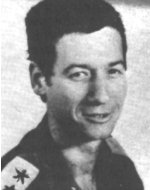Son of Ita and Jacob. He was born on April 22, 1952, in Rehovot. His parents, the survivors of the Holocaust, lived in Moshav Beit Gamliel and Shraga was a son of a house in the green fields and in the vast expanses surrounding the moshav where he used to run and play. Shraga began to attend elementary school in the village. As a child, he was a small, thin boy and his mother used to tell him: “Shraga’le, you will not grow up and you will not be an officer in the army.” Even though she grew up and raised over the years, the family always treated him as a frail child, who had to be protected. From elementary school Shraga moved to the Kfar Batya High School in Ra’anana. After completing his high school studies, he studied for one year at the College of Physical Education Teachers College in Givat Washington, where he stopped his studies and enlisted in the IDF, and Shraga was always cheerful, kind and Simcha, and these qualities gave him many friends who enjoyed being with him and doing pranks and mischief. In the course of time, while he was in the army, when his sister Etti moved to Eilat, Shraga specialized in swimming and diving, and he dived in the beaches of Eilat and De-Zahav (Dahab). He enlisted in the army for a draft postponement because he thought of joining the academic reserve, but decided to donate first The share of Homeland Security. Shraga was drafted into the Israel Defense Forces in October 1971. He was a medic, training officer, assistant head of the training department, The head of the Operations Branch, the Operations Branch Officer, the Commander of the Training Unit, the Head of the Training Theory Branch, and more. His uniform proudly displayed the wings of a parachutist, the signal of operational service and the symbol of the Yom Kippur War. Alongside his many roles, Shraga rose to the rank of lieutenant colonel. His commanders did not spare words of praise for the way Shraga fulfilled his duties: “Excellent officer”; “A very independent officer, a professional in his work, responds to every mission, the kind of officer who should be taken into battle.” “A dedicated and responsible officer, with command capability, volunteers for missions;” “A trustworthy and decent officer;” “He met his wife Keren during his service in the medical corps, and the couple settled in Moshav Beit Gamliel and had two sons, Oded, Kobi and Ronit. Shraga was also a member of the moshav committee and a representative of the moshav in the Hevel Yavneh Regional Council, and he had a sense of humor in writing humorous songs, even when he was diagnosed with leukemia, , Did not lose his sense of humor and wrote in one of his poems: “I left Lebanon unharmed, but found a lesion in me The operation succeeded? I’m asking / yes, extraordinary thank God / left foot a little weak, numb and limp / are the price of success / marathon will not run anymore // … we will travel to South Africa / family with children on vacation. ” On April 14, 1987, Lieutenant Colonel Shraga was killed while serving in the military cemetery in Rehovot, and the guard of honor was composed of combat medics and left a wife behind him. “I met Lt. Col. Shraga Deutsch at the beginning of his career in the Medical Corps … Even in the most difficult moments, Shraga stood out in his cool voice, Shalev God and humor, which never deserted him even under the worst circumstances. ShragaHe tied his fate with the family of the Medical Corps … The corps always cared for the development and nurturing of combat paramedics, and Shraga devoted many nights to the operational and professional preparedness of the Medical Corps units. “In Moshav Beit Gamliel, a playground named after him and his family and friends was published Booklet in memory.
